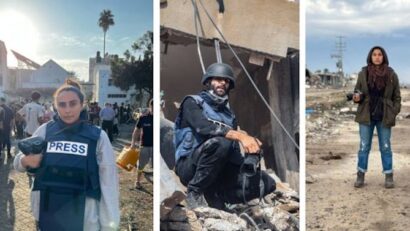
From stereotypes to sovereignty: How Indigenous media makers assert narrative control
Over the last 30 years, we have seen exponential growth of Indigenous media and Indigenous media makers, especially here in Canada which has one of the largest repositories of Indigenous media. This includes films, TV shows, documentaries and even reality TV.
But the road to get here hasn’t been easy.
This is because Indigenous filmmakers, producers and artists have had to navigate the complex and often unfriendly terrain of Canadian media institutions and media production companies.
But their negotiations — and struggles — over the past 30 years have helped make space for a new generation of Indigenous media makers now making shows and films on their own terms.
Darla Contois and Lisa Edelstein in the 2023 production of ‘Little Bird’ (Crave/APTN)
Crave/APTN
These Indigenous creators increasingly have more decision-making power — and more control over how their stories get told as well as the ability to subvert old colonial representations.
In a special episode of Don’t Call Me Resilient, recorded on-site with an audience in Vancouver at Iron Dog Books, we speak with Karrmen Crey, an expert on this new Indigenous media world. Crey speaks about the ways Indigenous creators are using humour along with a sharp critique of pop culture to show just how different the world looks when decision-making power over how stories get told shifts and Indigenous media makers take control.
Crey, who is Stó:lō from Cheam First Nation, is an associate professor in the School of Communication at Simon Fraser University in Burnaby, B.C. Her research focuses on Indigenously produced and created media in Canada and the media institutions that Indigenous people have had to navigate to produce their work. Crey is the author of Producing Sovereignty: The Rise of Indigenous Media in Canada.
Resources
From left, Sarah Podemski and D’Pharaoh Woon-A-Tai from ‘Reservation Dogs’
(Shane Brown/FX)
Producing Sovereignty: The Rise of Indigenous Media in Canada (by Karrmen Crey, 2024)
Rutherford Falls (TV sitcom)
Reservation Dogs (TV show)
“On-Screen Protocols and Pathways” (A report by the Indigenous Screen Office, 2019)
Kanehsatake: 270 Years of Resistance (a film by Alanis Obomsawin, NFB, 1993)
Shine Network
Rutherford Falls | Ultimate Show Breakdown.
Listen and follow
You can listen to or follow Don’t Call Me Resilient on Apple Podcasts (transcripts available), Spotify, YouTube or wherever you listen to your favourite podcasts.
We’d love to hear from you, including any ideas for future episodes.
Join the Conversation on Instagram, X, LinkedIn and use #DontCallMeResilient.
Credits
This podcast was recorded in front of an audience at Iron Dog bookstore in Vancouver as part of the Amplify Podcasting School. From left to right: Natalie Dusek on sound, Vinita Srivastava, Karrmen Crey.
(Catherine Zhu/The Conversation), Author provided (no reuse)
This episode was produced in front of a live audience at Iron Dog Books in Vancouver, in partnership with Simon Fraser University’s Faculty of Communication, Art and Technology and the Amplify Podcast Network. Simon Fraser student Natalie Dusek performed tech duties. Läs mer…


